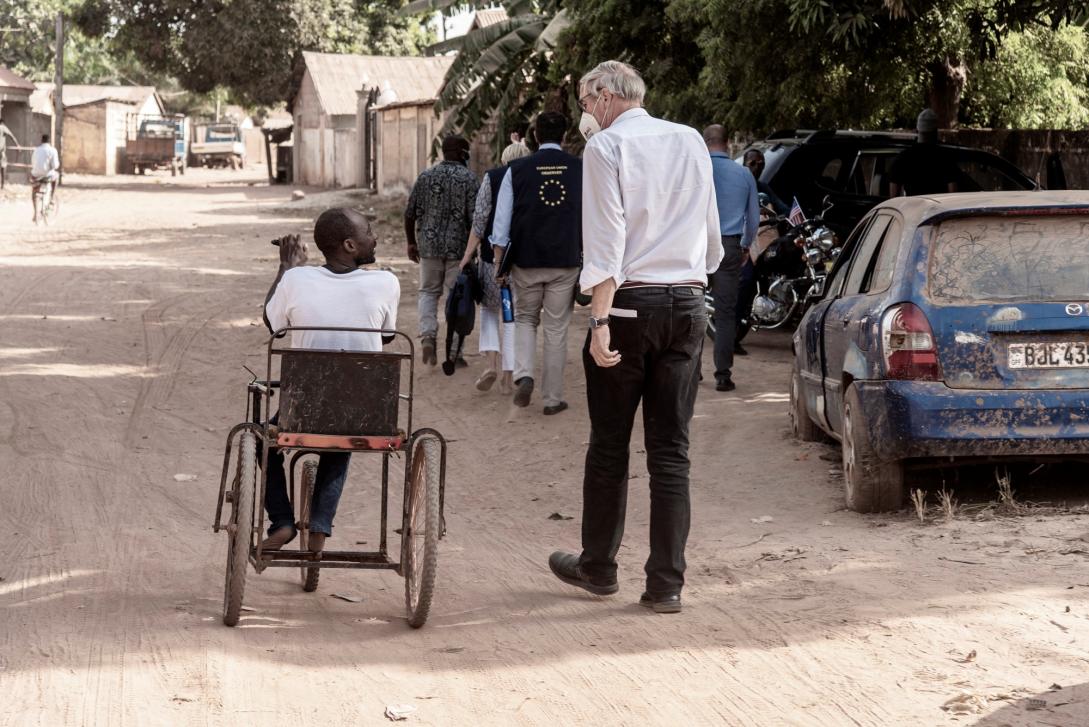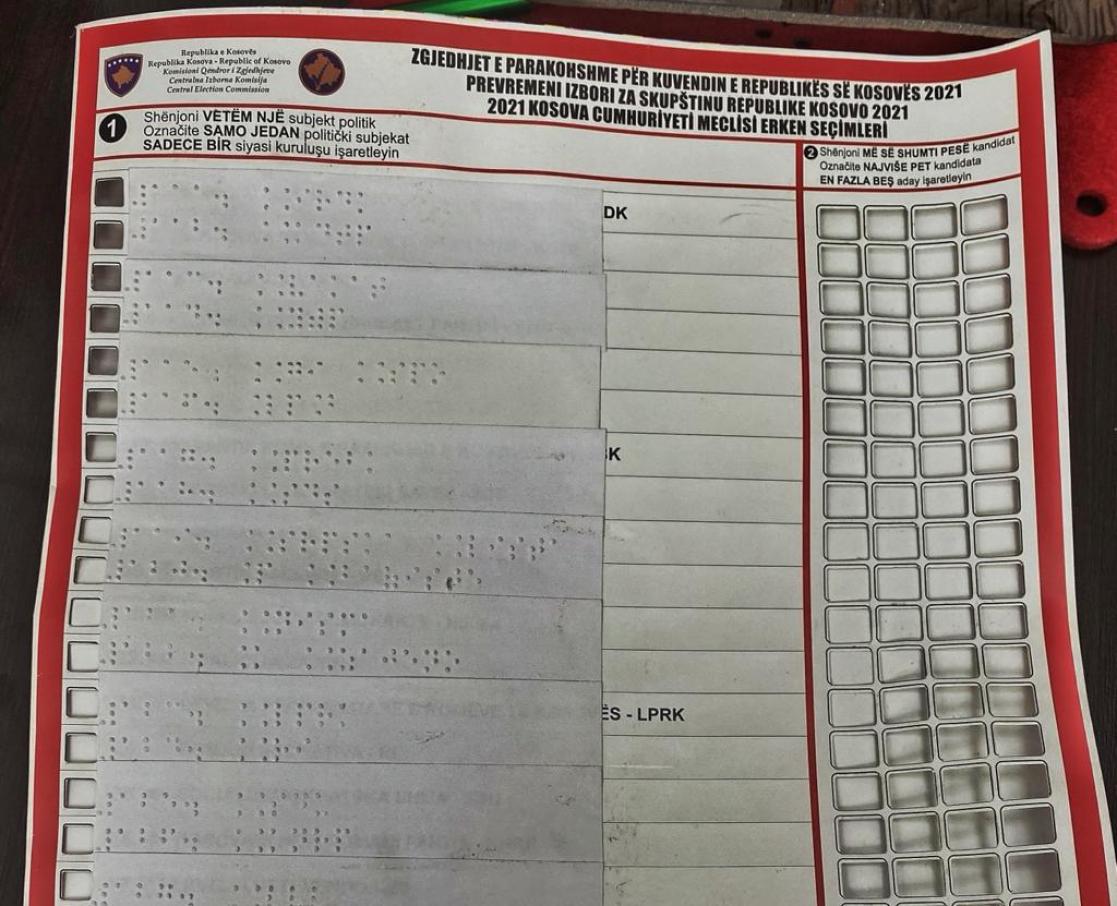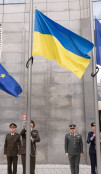When everyone is included, everyone wins

Photo description: Mr Norbert Neuser, Member of the European Parliament, as Chief Observer. © European Union / Rene Schulthoff, Press Officer, EU Election Observation Mission in The Gambia
As we mark today the International Day of Persons with Disabilities, we join the global call to remove the barriers towards an inclusive, accessible, and sustainable world. For a world enjoying its full potential, resilient and thriving.
A paradigm shift. How we talk and work with disability is fundamental.
During our times, the concept of disability has been going through a paradigm change. Our collective mind-set has long been occupied by the concept of disability as a problem that needs fixing, curing or eradication. This has led to stereotyping, defining people by their condition or their limitations.
However, if we dissociate disability from impairment, we can shift to a mind-set by which the physical, sensory, intellectual, or psychological individual difference are but variations of the human nature. It is not the person that has limitations. It is the way we think that is sometimes limited. The conversation needs to shift to barriers and to structural iniquities in society.
This paradigm shift emerged from the re-definition of disability by the World Health Organisation in 2001. Later in 2006, the United Nations’ Convention on the Rights of Persons with Disabilities (CRPD) follows the trend. In international law, persons with disabilities are not viewed as “objects” of charity, medical treatment or social protection; but as “subjects” with rights, capable of claiming them and making decisions, living as active members of society. The Convention gave universal recognition to the dignity of persons with disabilities.
Raising awareness and removing barriers. Around the world.
Today, 15 % of the world’s 7 billion people live with some form of disability. This means that more than one billion people in the world face barriers in one or more aspects of their life, related to a physical or mental impairment. 80 % of them live in developing countries.
This is why the EU works to promote the rights of persons with disabilities in its international policies. Earlier this year, the EU took concrete steps to make its external actions even more inclusive. The updated Human Rights Toolbox addresses all inequalities, and more importantly, discrimination against persons with disabilities, specifically looking into the importance of collecting data disaggregated by disability in programming, and inclusive and accessible consultations mechanisms.
When everyone is included, everyone wins. A thriving and resilient society cannot be achieved unless the wide range of human rights and fundamental freedoms can be exercised without discrimination, including by persons with disabilities.
Since 2000, the EU has deployed over 160 Election Observation Missions to over 60 countries. In the electoral context, citizens with disabilities have an equal right to participate. They have the right to vote, to stand as a candidate and to take an active role in the political life. This means authorities have the responsibility to guarantee their full participation in elections.
This is why the participation of people with disabilities in the electoral process is one of the observation areas of the EU Election Observation Missions. The EU considers the subject in full, even if a country has not ratified the CRPD, and therefore has more limited obligations.
This week, the Chief Observer of the EU Election Observation Mission in The Gambia visited the association of visually impaired people in Brikama, the second largest city in the country. The association members shared their views on the electoral process currently ongoing in the country.
Following a robust methodology based on UN principles, EU observers look into how electoral processes respect the rights of people with disabilities and follow-up with recommendations when necessary. EU election observation missions assess how authorities ensure that the rights of people with disabilities are respected, by:
- providing the opportunity in law and in practice to exercise their electoral and political rights, without restriction.
- lifting barriers to their participation in the electoral process and ensuring their inclusion in the voter register.
- making available accessible information and accessibility to campaign facilities and materials to persons with disabilities.
- promoting the inclusion of people with disabilities in political parties’ policies.
- providing equipment and full accessibility to people with disability to polling stations.

Photo description: Tactile ballot paper for visually impaired voters;
Author: Eirini-Maria Gounari, EU election analyst; EU Election Observation Mission in Kosovo
Raising awareness and removing barriers. In the EU.
Today, thanks to a solid EU legal framework, accessibility for persons with disabilities has greatly improved (see European Accessibility Act, Web Accessibility Directive, Passenger rights). Over the past ten years, the European Disability Strategy 2010-2020 placed persons with disabilities high on the agenda, and it has brought improvement in the areas of accessibility, awareness-raising, education and training. The strategy also made possible the implementation of the United Nations Convention on the Rights of Persons with Disabilities, to which the EU and its Member States are parties.
Our work continues. In March 2021, the EU launched its new strategy on the rights of people with disabilities for 2021-2030. In short, we call it ‘the European Disability Strategy’. It covers all aspects of the United Nations Convention of the Rights of Persons with Disabilities. It is EU’s work plan to protect the rights and improve the lives of people with disabilities in the EU and around the world.
My rights, my voice.
In the context of the World Day on the Rights of the Child (20 November), our colleagues for the EU Delegation to the Council of Europe, together with the Permanent Representations of Andorra and San Marino, gave a voice to children, to speak about their own rights.
Listen to the voice of children learning in special education schools.
"All Equal, All the Same" Children from Evryviadeio Gymnasium, Larnaca, Cyprus
“You and I” Children from Apostolos Loukas Special School, Limassol, Cyprus
The International Day of Disabled Persons aims to promote the rights and well-being of persons with disabilities in all spheres of society and development, and to increase awareness of the situation of persons with disabilities in every aspect of political, social, economic and cultural life.
See also
- European Disability Strategy 2010-2020
- EU Work on Human Rights and Democracy
- Communication: Union of Equality: Strategy for the Rights of Persons with Disabilities 2021-2030
- Easy-to-read version: Strategy for the rights of persons with disabilities 2021-2030
- Q&A: Strategy for the Rights of Persons with Disabilities 2021-2030
- Factsheet: Strategy for the Rights of Persons with Disabilities 2021-2030
- News in easy-to-read: The European Commission puts out a new strategy to protect the rights of persons with disabilities
- More information on EU initiatives for persons with disabilities
- World Health Organisation - Disability
- World Report on Disability
- Want to work with us? How the EU takes into account special needs for candidates





